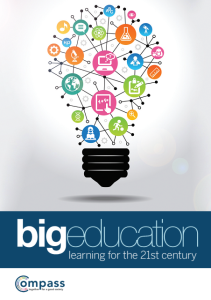
We’ve been trained to see education as a way of getting ahead economically. It has to be about more than that writes Ken Spours launching Compass new publication – Big education: learning for the 21st century.
An election looms large and yet the debate around education is so small. Labour and Tories diverge around whether to have more free schools or university fees of £6000 versus £9000, but the purpose of education and the antiquated nature of the way we educate are left untouched.
The abiding metaphor of education is now a race, a global race in which every country and every person has to become ever more competitive. The best nursery, followed by the best school, the best university all to get the highest paying job. Along the way we learn to compete and to be in debt. Our children and their teachers become stressed and anxious in this arms race that can never end. At the very least, once every five years we should discuss if this is right.
It is into this gaping vacuum we can plant the idea of Big Education. Drawn from the life’s work of many and detailed discussion between hundreds of teachers, students, employers and educationalists over the last two years, this publication builds a bridge for education as it is, to the most expansive vision of what education could and should be.
Its ambition is rooted in the argument that the role of education is to help people not only to live and thrive in the world in which they find themselves but also to be able to see beyond their current condition and develop the capacities to build a better collective future – education as personal and social transformation. The irony of the political silence is that education is one of the crucial vehicles in creating a democratic future and in order to succeed that democratic vision has to become an integral part of education that we experience every day. In this sense, we see education as a unity of means and ends.
If we step back for a minute and think about what ‘education for all’ actually means we realise that it is a quite staggering human mission. Modern behavioural human beings have been around for over 60,000 years. Learning from another has a long history, but education as we now know it has barely existed for 100 years. Our education journey is therefore in its absolute infancy.
Even during this short period, expansive ideas about education for all have had little time to flourish. Over the past 30 years, in particular, open and comprehensive visions have been challenged and replaced by a narrow, privatised and impoverished ‘Anglo Saxon model’ of education. The coalition government has promoted this model in more extreme forms.
Not only is this model deeply unfair, it is increasingly out of step with the needs of what we refer to as New Times – the more lateral and inter-dependent world being shaped by a new global economic, technological and social forces. While sometimes doesn’t feel like it, we are in a transition period between an increasingly elite neo-liberal system that is dying on its feet and a networked economic and social future that is in gestation. We are on the cusp and education helps us to see over the horizon.
A big part of this emerging horizon is the need for a workforce that doesn’t compete but co-operates. The successful organisations of the 21st century will have workers that are relational and empathetic, that collaborate and support each other. This isn’t the pipe dream of the left but the demand now of the CBI.
As a result, people across the world, amidst very challenging circumstances, are rethinking the role of education. This is leading remorselessly to a more expansive vision – cradle to grave, starting early and finishing late; combining broad foundations and increasing specialisation, knowledge and broader skills; education as formal and informal, education in schools, colleges, workplaces, communities and now as part of the world-wide web. This multi-dimensional view of education helped us to choose the term ‘Big Education’ as an ambition for our system.
Big Education thus needs to be thought of in terms of an education system that functions in the interests of all, for all our lives. In this sense, we are talking about a new comprehensive vision – not just the comprehensive school but a comprehensive local area, curriculum and life long project.
But even Big Education cannot change the world on its own. What wider international comparisons tell us is that more successful comprehensive education systems, such as Finland and parts of Canada, create the pre-conditions for better education outcomes. These include a realisation that education functions best when inequality gaps are closed. You cannot ultimately build Big Education on the top of an unequal and poverty stricken society. Moreover, it will be difficult to build it without patience and deliberation – that means a much slower and participative policy process.
Big Education is a journey, not a blueprint. What matters is not how we can churn out ‘winners’ from factory schools but how the process and experience of education prepares us to be citizens and workers in the 21st century. This means reaching out to all those, the usual suspects and the less usual ones, who are trying to rethink education beyond the current settlement. The election may not change that much but the way we educate is going to have to change profoundly.
Click here to download the full publication: Compass – BIG education: learning for the 21st century.
This article was first published in the New Statesman: Forget the global race. Education is about more than that.
